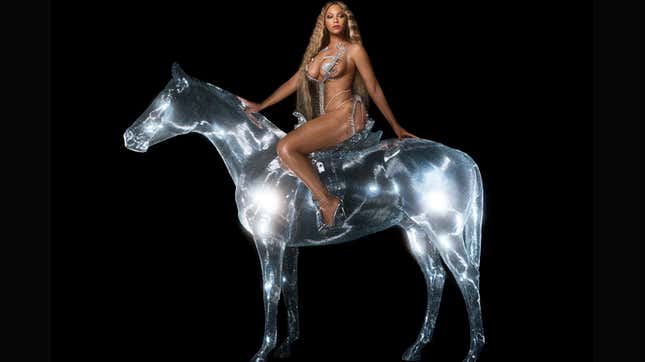Nobody Makes You Dance Like Beyoncé Makes You Dance
The superstar's new album, Renaissance, is a love letter to the four-on-the-floor beat that manages to both overwhelm and hit just right.
EntertainmentMusic

I’m not in the business of reading minds, and attempting to do so with a superstar as taciturn as Beyoncé would be an exercise in pure projection at any rate, but objectively speaking, it was time for a hit. And while there are no guarantees in life, dance music is a fairly safe bet if you’re looking to command a crowd.
Beyoncé hasn’t been absent from pop culture, per se—in 2017, she went to No. 1 on the Billboard Hot 100 on a duet remix of Ed Sheeran’s “Perfect,” and her 2019 concert film/live album Homecoming was very much an event—but it’s been a while since she stopped the world with a drop. After the beloved Lemonade (itself a cohesive statement and not exactly a factory of hit singles), she released Everything Is Love with Jay-Z and then The Lion King: The Gift. Neither were technically Beyoncé albums in the classic sense, nor did they hit like the classic Beyoncé albums did.
On Renaissance, arguably her seventh solo studio album (if you don’t count The Gift), she comes charging back into the hit-making fray on a horse that’s glimmering like a disco ball. So far, it’s working: The set’s first single, “Break My Soul,” currently sits at No. 7 on the Billboard Hot 100 (the first Beyoncé-led single to enter the Top 10 since “Formation” peaked at No. 10 in 2016) and, thanks to heavy airplay, is at this point practically ubiquitous. It entered a culture primed to receive it. Pop’s embrace of dance music has been somewhat cyclical—the four-on-the-floor thump of disco evaporated for a while during the mid-‘80s only to come stomping back when house music went commercial in the early ‘90s. Toward the end of the aughts, that pounding bass drum returned yet again, in part due to StarGate collaborations with Rihanna (“Don’t Stop the Music”) and Ne-Yo (“Because of You”). Lady Gaga launched a career on throbbing dance pop. Katy Perry and Ke$ha racked up piles of housey hits. . With “Call Me Maybe,” Carly Rae Jepsen delivered an all-time classic. Daft Punk had its biggest success on the U.S. charts with the Pharrell/Nile Rogers collab “Get Lucky” in 2013. Lately, the likes of Doja Cat and Dua Lipa have been trading pretty heavily in disco.
Dance music has been renaissance’d. Renaissance’s novelty, then, is that it’s a full-length album of dance music by Beyoncé. The renaissance is hers, not her form’s.
-

-

-

-

-

-

-

-

-

-

-

-

-

-

-

-

-

-

-

-

-

-

-

-

-

-

-

-

-

-

-

-

-

-

-

-

-

-

-

-








































